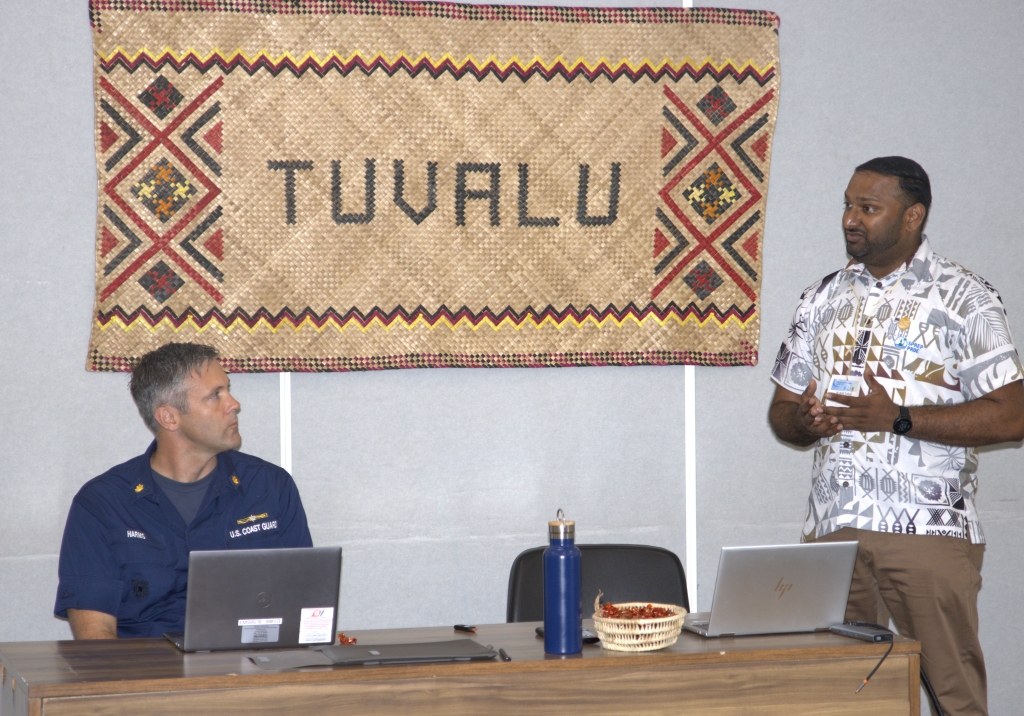Work to reduce marine pollution in Pacific countries discussed at 4CPRT
6 August 2024, Funafuti Tuvalu - The Pacific Ocean is the lifeblood of our Pacific communities. It sustains livelihoods, cultures, and economies.
However, the growing threats of marine pollution as a result of oil spills, marine invasive species, and the legacy of World War II (WWII) shipwrecks, pose significant challenges to this delicate ecosystem.
In terms of shipwrecks, there are over 3000 ships sank in the Pacific, with most of them in the economic zones of the Federated States of Micronesia, Palau, Papua New Guinea, the Republic of the Marshall Islands and Solomon Islands.
On the second day of the Fourth Clean Pacific Roundtable (4CPRT) in Tuvalu, delegates from Pacific countries delved into a knowledge exchange and discussion on ongoing technical work to reduce and manage marine pollution the region.
The session, held in parallel to a Sustainable Circularity session, provided delegates with a brief on projects and technical assistance to improve the prevention and response to marine pollution.
One of them is Papua New Guinea’s National Marine Spill Contingency Plan, developed to reflect the country’s commitment to protect its valuable coastal and marine resources. The Plan was developed to reflect the essential steps necessary to initiate, conduct and terminate an emergency spill response on, or into the navigable waters of Papua New Guinea.

Mr Pawa Limu, Manager, Marine Environment Protection, NMSA, highlighted the successes and challenges and the ongoing in spill prevention and response.
The Senior Marine Environment Officer of Tonga’s Marine and Ports Division, Ministry of Infrastructure, Mr Hema Tupou, spoke on Control and Management of Ships' Biofouling, highlighting the progress on the work on National Biofouling Strategies on managing Invasive Aquatic Species in the Kingdom.
The session also featured Cmdr Jesse Harms, Chief of Contingency Planning, US Coast Guard, who spoke about Leadership in a spill response crisis. A video recording from Managing Director, Urban Mining Industries Pty Ltd, Mr. Edward Meysztowicz, delved into Emerging technologies and innovative solutions.
Mr Toma Mesake, Acting Director, Tuvalu’s Maritime Department who opened the session said it was critical to highlight best practices and discuss regional strategies and action plans to address these pressing environmental issues.
“Our gathering this week here in Tuvalu, underscores the shared commitment of our region to safeguarding our pristine marine environment for present and future generations,” he said.
“We will delve into the complexities of marine pollution, exploring successful case studies, innovative solutions, and regional strategies. Our expert panel will provide invaluable insights into the latest developments in pollution prevention, response, and management.
“By the end of this session, we aspire to achieve a deeper understanding of the regional cooperative framework for marine pollution response, PACPLAN Plus, and identify actionable steps to address the pressing issue of WWII shipwrecks.”
SPREP’s Pollution Adviser, Mr Mohammed Asid Zullah said it is imperative that Pacific countries adopt a comprehensive approach that addresses marine pollution from all sources.
“This includes strengthening regional cooperation, capacity building, and knowledge sharing. By working together, we can safeguard the health of our Pacific Ocean for present and future generations,” said Mr Zullah.
ABOUT 4CPRT
The Fourth Clean Pacific Roundtable (CPRT) facilitated by the Secretariat of the Pacific Regional Environment Programme (SPREP) is hosted by Tuvalu from 5 – 9 August 2024.
The Roundtable is intended to provide a vehicle to disseminate outcomes, promote regional collaboration and resource complementarity, and expand networking opportunities to assist Pacific Island countries and territories in the delivery of safe and sustainable waste management practices. It will also prevent pollution-related issues that impact the health of the ocean and communities within the region.
It is attended by the Cook Islands, Fiji, French Polynesia, Kiribati, Marshall Islands, Nauru, Niue, Palau, Papua New Guinea, Samoa, Solomon Islands, Tonga, Tuvalu and Vanuatu.
For more details and the programme, click: https://www.sprep.org/4th-clean-pacific-roundtable
